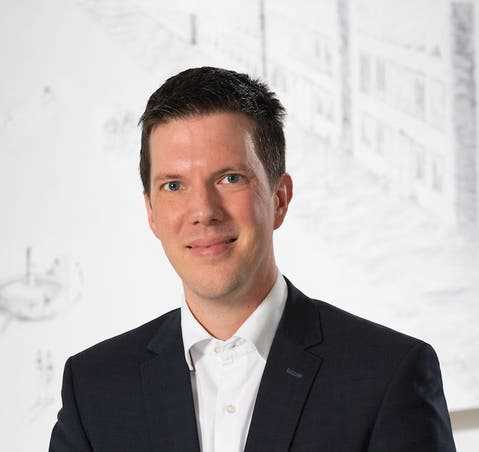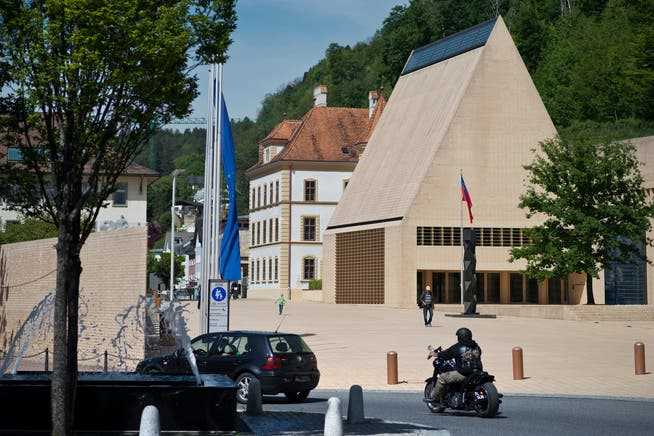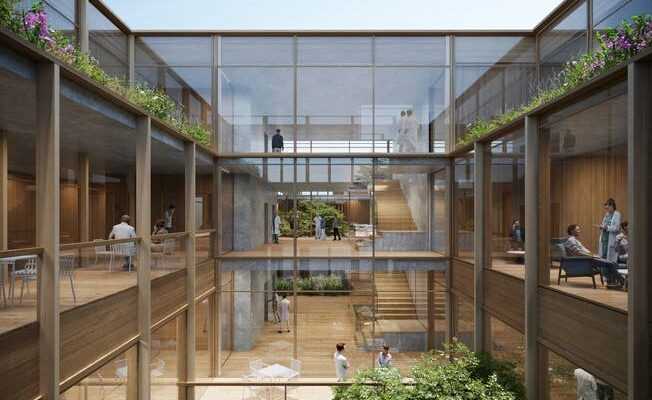The new Liechtenstein hospital could cost 20 million francs more than planned. The government has had to take massive criticism, and the minister responsible has been accused of incompetence. And an old question comes up again: Does a country with almost 40,000 inhabitants need its own hospital?
Visualization of the Vaduz State Hospital.
Those who claimed three years ago that the planned Liechtenstein state hospital would cost 100 million francs now see themselves confirmed. For the 2019 referendum, the government presented a budget of CHF 72.5 million. But this will apparently not be enough to finance the new building. As the social affairs minister Manuel Frick announced to the public, the commitment credit cannot be adhered to within the framework of the previous project planning. The planning will be stopped for the time being, an investigation has been initiated.
At CHF 97.7 million, the costs calculated by the project planners touch the 100 million mark and are thus CHF 21.1 million higher than the commitment credit approved by Parliament and the people. The result was what many had predicted before the referendum. The hospital is still in the planning phase, and the groundbreaking ceremony for the new building will probably not be forthcoming for a long time.

The Minister of Society Manuel Frick.
Since this announcement, representatives of the parties have outdone themselves with demands on Frick. He only took office a year ago and had to take over the delicate issue of building new hospitals from his predecessor. The opposition is now demanding a special agenda item for the May session of parliament and full clarification. There is also a call for a parliamentary investigative commission to be set up to bring transparency into the planning process.
The splinter party calls for a new vote
The splinter party called The Independents, which failed to win a mandate in the last elections and is now involved as an extra-parliamentary opposition, is going one step further: an appeal to the State Court of Justice is planned to declare the 2019 vote void. Independents say voters have been misled by an inaccurate estimate and vague project dates. As soon as reliable project data are available, voters should be given another opportunity to vote on a new building for the state hospital.
Not only opposition politicians have positioned themselves against the Minister of Society. Parliamentarians in the governing coalition are also calling for clarification and for government representatives to assume responsibility. However, the parties’ public surprise about the increase in costs would have been less if they had remembered the statements made by the Minister for Social Affairs in the December session of Parliament.

The debate about building a new hospital is likely to dominate Liechtenstein politics in the coming months. The picture shows the government building in Vaduz.
Although Frick did not name any specific figures at the time, he did explain that the winning project from the architectural competition exceeded the budget by almost 9 million francs, but only met 80 percent of the conditions of use. A revision of the content of the project was therefore necessary. According to Frick, this resulted in an “efficient and compact building” that meets both clinical and operational requirements. The financial targets, which were far exceeded, were not met.
Frick justified the fact that the cost framework presented to Parliament and the referendum was only an estimate. But now there is a cost calculation that has provoked a planning stop due to its extent. This leaves the government with two options: either the plan is adjusted so that the costs approved by the people can be met, or a supplementary loan is submitted to parliament. In the second case, the new state hospital is likely to reach or exceed the 100 million mark.
Such a loan request, if approved by Parliament, would be subject to a referendum. In this case, according to opposition circles, a referendum is being considered to let the people decide on the additional loan.
Does Liechtenstein need its own hospital?
Opposition politicians have also raised the question of whether Liechtenstein, with almost 40,000 inhabitants, needs its own hospital at all. In response to relevant questions, the government emphasized in the 2019 voting documents that having its own high-quality hospital would ensure Liechtenstein’s future freedom of action as a sovereign country and, as a company, would also bring economic benefits.
The government considered the basic medical care of its own population to be important for political reasons, especially in extraordinary situations such as epidemics or catastrophes. In contrast, the opponents pointed to the mergers and cooperations in the hospital system that can be observed in Switzerland. The “competitive strategy against the Grabs hospital” was also criticized: A new hospital of its own practically excludes cooperation with the St. Gallen regional hospital.
Liechtenstein patients can be treated at Grabs Hospital based on contractual agreements. After the maternity ward in the existing Vaduz state hospital was closed for economic reasons, most Liechtenstein women go to the neighboring hospital on Swiss soil to give birth.
A close cooperation between the hospitals in Vaduz and Grabs, which was discussed years ago, did not come about after a change in the hospital strategy of the canton of St. Gallen. The “horizontal cooperation” demanded by many at the time, which would have connected two regional hospitals a short distance away, failed due to the different views of the governments.
A proposal from Liechtenstein to form a joint sponsorship in view of the two hospitals in need of renovation and to build a joint new building near the border fell through with the St. Gallen government. Conversely, the Liechtenstein government rejected the proposal to integrate Liechtenstein into the new St. Gallen hospital network for reasons of principle: the fear was that joining the St. Gallen hospital region would mean that Liechtenstein would have to subject itself to the responsibilities and decision-making processes instead of to to participate on an equal footing.
